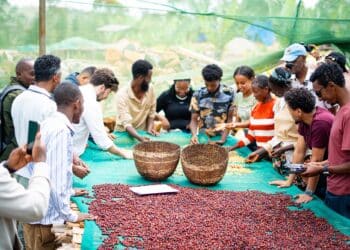Coffee prices are continuing to fall according to the Intercontinental Exchange (ICE) Futures Market.
Robusta prices dropped more than 4.8 per cent on Monday 21 July to reach its lowest mark (US$3489 per tonne) since June 2024.
The continuing fall of Robusta prices is likely largely due to a projected four-year high in harvest figures for the world’s largest producer of Robusta coffee, Vietnam, in 2025/26.
Vietnam has experienced significant harvest headaches over the past two years, with its 2023/24 crop registering its lowest in four years.
Drought has been the key influencing factor in the reducing size of Vietnam coffee harvests in recent years, with the Vietnam Coffee and Cocoa Association recently reducing its 2024/25 projections from 28 million 60-kilogram bags to 26.5 million bags.
The 2025/26 harvest is currently projected to come in at 31 million bags according to the United States (US) Department of Agriculture’s Foreign Agricultural Service.
ICE-monitored inventories for Robusta coffee also hit a 10-month high of 6243 lots earlier this week, while Arabica inventories have plummeted to a three-month low of 811.204 bags.
Arabica prices have continued the largely downward trend seen since early June, with the threats of a 50 per cent US tariff on all Brazilian imports from August 1 spiking prices earlier in July.
Weather influences in Brazil, including winter frost and a lack of rain in key producing regions continue to see harvest projections of coffee from the world’s largest producer slump.
Cecafe has reported Brazil’s total green coffee bean exports for June dropped 31 per cent year-on-year to 2.3 million bags.
Brazilian agricultural market watch platform Safras & Mercado have reported Brazil’s 2025/26 coffee harvest was 77 per cent completed as of 16 July, which is slightly ahead of the 74 per cent of harvest completed at the same time last year.
Volcafe is also predicting an international Arabica deficit of 8.5 million bags in 2025/26, which is a marked increase from the 5.5 million-bag deficit in 2024/25.
If 2025/26 does result in an Arabica coffee deficit, it will be the fifth consecutive year of deficits.





